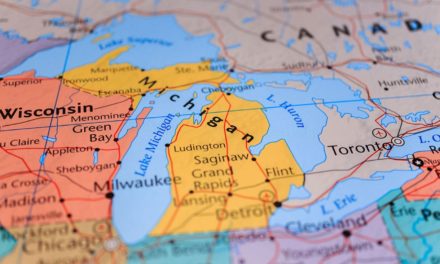Some of Michigan’s nearly 1.4 million student loan borrowers, who owe a cumulative total of $51 billion in student loan debt, are rejoicing after the Biden administration announced its Student Loan Forgiveness Plan, which would cancel up to $10,000 in federal student loan debt for millions of borrowers across the nation.
Under Biden’s plan, borrowers earning under $125,000 could be eligible for up to $10,000 in forgiveness, and for borrowers who have Pell Grants, the amount jumps to $20,000. The Biden administration’s Student Loan Forgiveness Plan also includes a continued pause on loan collection through December 2022, and includes some potential changes to the income-driven repayment policies.
One Detroit Associate Producer Will Glover sits down with BridgeDetroit reporter Isabel Lohman to learn more about the different components involved in Biden’s Student Loan Forgiveness Plan, as well as talk about the catalyst for announcing the loan forgiveness program and the arguments for and against it. Plus, Lohman shares how some metro Detroiter student loan borrowers reacted to the news, and the two posit whether the proposed plan will help resolve the larger issue of expensive, inaccessible higher education.
Full Transcript:
Will Glover, Producer, One Detroit: We’re here to talk about a recent article you wrote that appeared in BridgeDetroit that was talking about the recent action on the federal student loans from the Biden administration. So first things first, what is the plan? What’s it called? Who’s eligible?
Isabel Lohman, Education Reporter, Bridge Michigan: Sure. So there’s a couple of different components of the plan. The thing you’ve probably heard the most about is the student loan forgiveness program. That would mean that some student loan borrowers, depending on their income, could get up to $10,000 of their federal student loans forgiven. And for students who had Pell Grants during college, they could get up to 20,000 thousand of their student loans forgiven.
But there’s other components of the plan, too. There’s a continued pause on collection of student loans. So if you have a student loan, you can be making payments on it right now. But you don’t have to in many cases. And that is true through the end of December, and you don’t have to pay interest on it right now.
And then there’s also a plan that the Biden administration is putting forward to change some aspects of the income-driven repayment policy. So if this plan were to work, essentially people who are in an income-driven repayment program, which is where your income helps determine how much you pay per month, there’s some changes to that that could make it easier for folks to pay back their loans and then also give them some relief when it comes to the interest, that is often the concern for folks.
Will Glover: What was the catalyst for this to be instituted?
Isabel Lohman: Sure. So President Biden, back when he was on the campaign trail, this was one of the things he campaigned on was to have some sort of student loan forgiveness program. And it’s something that has been talked about in progressive circles for quite a while. There are people that wanted him to forgive a lot more than 10,000 thousand.
And of course, there are people who wanted him to forgive absolutely no money. But some of the main reasons arguing for this type of loan forgiveness is that there are many people in this country who have student loan debt but don’t have the degree. So they don’t have the higher wage earnings that typically come with the degree, but they have the burden of debt.
And so people argue that that puts them in a place where they cannot economically make sound decisions, that they’re further and further behind. Another argument is that families and students and anyone who’s borrowed money in the last couple of years with student loans, they have really enjoyed this period where they do not have to make student loan payments. And so there’s an argument to be made that by forgiving some of these loans, you are helping these people get ahead and that they will ultimately stimulate the local economy, the state economy, and the national economy.
Will Glover: What is the effect of this debt here in Michigan? How many, how much debt do people in Michigan have? And how is this going to impact Michiganders?
Isabel Lohman: Sure. So the Education Data Initiative estimates that there are about 1.4 million student loan borrowers in Michigan with a collective debt of about $51 billion. So it’s quite a large chunk of money. When you look at that, of course, there is variance, right? Some folks owe only a couple thousand dollars, some owe way more. When you look at the state borrowers within that group, about 16% of those folks owe less than $5,000. While about 21.6% of people owe between $20,000 to $40,000.
Will Glover: When it comes to eligibility. Who’s in? Who’s out? What are the figures around that?
Isabel Lohman: Sure. So it’s based on your income. So if you make up to $125,000 a year or if you’re a household that makes under $250,000 a year, you’re eligible for up to $10,000 of loan cancelation. If you received Pell Grants, that number goes up to $20,000. It’s important to note this is up to. So hypothetically, let’s say I’m a borrower, I make within that income level, but I only owe $8,000. The government is not going to say, okay, here’s $8,000 forgiven and here’s that $2,000 check. You’re just going to get up to the amount that you owe.
Will Glover: What have you heard from the opposition when it comes to this debt relief?
Isabel Lohman: There’s a couple of different points that they bring up. One is the idea that this is an unfair way of going about it. So some folks would say higher ed is too expensive as it is, but this is just a Band-Aid on the issue. This isn’t going to solve how much college costs. It’s not going to solve the idea that people are still taking student loans out. So that’s one argument. Another argument is from folks who maybe didn’t go to college or paid their way through college or for whatever reason, don’t have loans themselves. And they will argue that they are paying for someone else’s education. So they will say that’s not fair.
Will Glover: What was some of the reaction to the debt that’s being forgiven from one of the college students that you spoke with, somebody who’s currently still in college?
Isabel Lohman: I talked to someone who has about $5,000 in student loan debt and she’s expecting to have that fully forgiven. She thinks that’s great, but she doesn’t think it’s going to ultimately solve everything. I talked to another student who’s expecting to get some student loan relief, but she’s also expecting to still have student loans at the end of the day, even with this forgiveness. So, I think there is a sense of optimism and a sense of, wow, this has never happened before and this is historic and let’s be thankful for that. But there’s also that, like I said, broader conversation about how do we pay for college moving forward.
Will Glover: Are we going to be in a much better position because of this loan forgiveness or are we going to kind of be in the same position with just a slightly smaller loan balance or principle balance for people who still owe money?
Isabel Lohman: I think it’s a both-and situation. I think the devil’s are in the details. Right. So people know this number. People know that they could get up to, in some cases, $20,000 thousand of loan forgiveness. But they need to be able to know how to access that forgiveness. They need to access the form that the federal government is expected to release in October.
And we need to see how this plays out. Right. It’s one thing to think, okay, I’m going to have some relief. It’s another thing to see that in your credit score, in your pocket, in your monthly budget. So all of those things I think are left to be seen. I think there’s also, like you said, a broader question of how do we make this work for everyone and how do we figure out what this means for Michigan practically? But this isn’t going to solve the fact that there are still plenty of Michiganders and plenty of Americans that are going to have a lot of debt on their hands.
Stay Connected:
Subscribe to One Detroit’s YouTube Channel & Don’t miss One Detroit Mondays and Thursdays at 7:30 p.m. on Detroit Public TV, WTVS-Channel 56.
Catch the daily conversations on our website, Facebook, Twitter @DPTVOneDetroit, and Instagram @One.Detroit
View Past Episodes >
Watch One Detroit every Monday and Thursday at 7:30 p.m. ET on Detroit Public TV on Detroit Public TV, WTVS-Channel 56.




